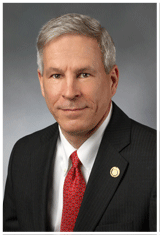JEFFERSON CITY — Today, (Feb. 3) Senator Rob Schaaf (R-St. Joseph) introduced the Missouri Anti-Corruption Act (SJR 13) — a proposal to address institutional corruption in Missouri government by overhauling state ethics, lobbying, and campaign finance laws.
In summary, the Missouri Anti-Corruption Act would:
-
Prohibit politicians from accepting gifts and job offers from lobbyists.
-
Close loopholes to ensure that all people who lobby register as lobbyists.
-
Prohibit political contributions by unions and corporations, and restrict contributions by lobbyists.
-
Limit the size of all political contributions.
-
Strengthen the Missouri Ethics Commission.
-
Require full disclosure of all money spent on Missouri politics.
-
Prohibit secret coordination between candidates and political action committees (PACs).
-
Empower everyday Missourians and reduce the influence of special interests by establishing a rebate program designed to encourage small contributions.
If passed by the state Legislature, the Missouri Anti-Corruption Act will be referred to the 2016 ballot for a public vote. If approved, it will be adopted as an amendment to the Missouri Constitution. Members of the press and public can stay up-to-date with the bill’s progress by sending an email to rob.schaaf@senate.mo.gov with “Missouri Anti-Corruption Act Email List” in the subject line.
Sen. Schaaf issued the following statement:
“In our state government, it is too often deep-pocketed special interests who set the agenda. The Missouri Anti-Corruption Act will help to ensure that Missouri's government is truly of, by, and for the people.
During my 12 years in the Missouri legislature, I've come to realize that our political process has been subverted. It’s a problem of good people caught in a bad system. When elected officials depend on a small set of special interests to provide campaign funds – not to mention meals and other gifts – they listen too keenly to what those special interests want. Instead of listening to patients, they listen to healthcare industry executives. Instead of listening to small business owners here in Missouri, they listen to big corporations owned by people in other states and other countries. And they don't focus enough on issues that matter to everyday Missourians – issues like jobs and education – because they’re too busy trying to appease the special interests that fund political campaigns.”
Fact Sheet: Money and Institutional Corruption in Missouri Politics
-
Under current Missouri law, it is legal for individuals to give an unlimited amount of money directly to candidates. This practice is illegal at the federal level, and Missouri is one of only 11 states with no limits on individual contributions. From 2011 to 2013, more than 32 percent of the money contributed at the state level by individuals in Missouri came in the form of checks worth $25,501 or more.
-
Under current Missouri law, it is legal for unions and corporations to give an unlimited amount of money directly to candidates. This practice has been illegal at the federal level since 1907, and Missouri is one of only 6 states with no limits on corporate or union contributions. Many corporations and unions rank among the top contributors in Missouri politics.
-
Missouri is the only state in the country that allows elected officials to receive both unlimited campaign contributions and unlimited gifts from lobbyists. In the past two years, Missouri legislators have accepted more than $1.8 million in gifts from registered lobbyists, with some legislators accepting more than $15,000 in such gifts. Registered lobbyists outnumber lawmakers in Missouri nearly 5-to-1.
-
Missouri received a grade of “C minus” on the State Integrity Investigation corruption risk report card, driven in large part by “F” grades in the categories of political financing and public access to information, and a “D minus” in lobbying disclosure.
-
Numerous other polls indicate that commanding majorities in both parties support strict disclosure requirements, limits on campaign contributions, and other reforms designed to make politicians more accountable to everyday citizens.
To read more about Sen. Schaaf, visit www.senate.mo.gov/schaaf. |



